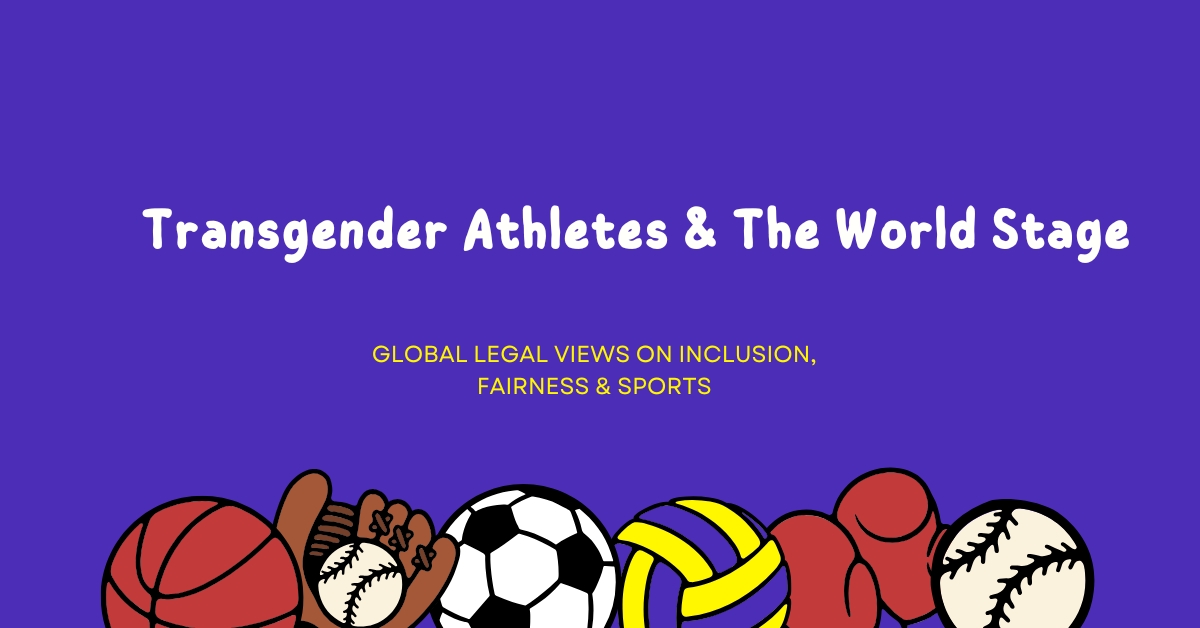Executive Summary
Transgender sports participation has become one of the most polarizing legal issues globally, testing the limits of equality, safety, biology, and public policy. Governments, courts, and sports bodies are under pressure to balance anti-discrimination rights with the principles of fair competition.
This blog examines how different countries such as India, UK, Canada, US, UAE, Pakistan, China, Japan, Russia, France, Brazil, and others are grappling with the regulation of transgender athletes in schools, amateur leagues, and elite-level sports.
With updated case law, statutes, and international benchmarks, this is the most comprehensive comparative legal guide on transgender sports participation.
Why This Issue Matters
The legal, ethical, and biological questions surrounding transgender sports participation are complex and unresolved in many regions. Key global concerns include:
- Can self-identified gender be the sole basis for participation?
- Should hormonal or surgical transition be mandatory?
- Are exclusionary policies defensible under anti-discrimination law?
- What role do international sports federations play in shaping national compliance?
This blog offers legal clarity and comparative insight into how different systems handle these questions.
International Sports Bodies: Evolving Policy on Trans Inclusion
While domestic laws shape national policy, international sports federations have immense influence over how transgender sports participation is governed worldwide. In many countries lacking clear legislation, it is the rules of global governing bodies like the IOC, World Athletics, or FIFA, that determine eligibility.

IOC’s 2021 Framework on Fairness, Inclusion & Non-Discrimination
In November 2021, the International Olympic Committee (IOC) released a new non-binding framework replacing its earlier 2015 consensus. Key takeaways:
- No presumption of advantage based on gender identity alone
- No requirement for hormone levels unless evidence-based
- Shifts burden of proof to federations, not athletes
Read More: IOC Framework on Fairness & Inclusion
This policy now guides federations across sports. However, it lacks enforcement power, leading to varied national and regional interpretations of transgender sports participation standards.
Divergence in Practice
- World Athletics (2023) banned transgender women from elite female events if they had undergone male puberty.
- FIFA stated it will consider inclusion case-by-case.
- FINA (World Aquatics) introduced an “open” category after barring transgender women from women’s races.
The disunity between federations contributes to ongoing legal ambiguity and pressures national systems to comply, either by codifying rules or facing exclusion from global events.
The Intersex Question: Distinguishing From Transgender Participation

A nuanced issue in the transgender sports participation debate is the conflation of transgender and intersex athletes. While both categories fall outside traditional gender norms, their legal and biological status differs, which has significant implications for sporting eligibility.
Legal Distinction
- Transgender persons: Individuals whose gender identity differs from the sex assigned at birth.
- Intersex individuals: Born with sex characteristics that do not fit typical male or female definitions.
Countries like India (NALSA judgment) and South Africa recognize intersex as a third category or within broader definitions of transgender. However, from a sporting perspective, this distinction matters, especially in case law like that of Caster Semenya.
Caster Semenya Case (Court of Arbitration for Sport – CAS)
Semenya, a cisgender woman with differences of sexual development (DSD), was required by World Athletics to lower her natural testosterone levels to compete. She refused, resulting in exclusion.
Read: Semenya v. World Athletics – CAS Decision Summary
Though not transgender, her case deeply informs arguments about bodily integrity, consent, and the role of hormones in defining eligibility, issues also central to transgender sports participation.
Institutional Enforcement: Where Law Meets Practice
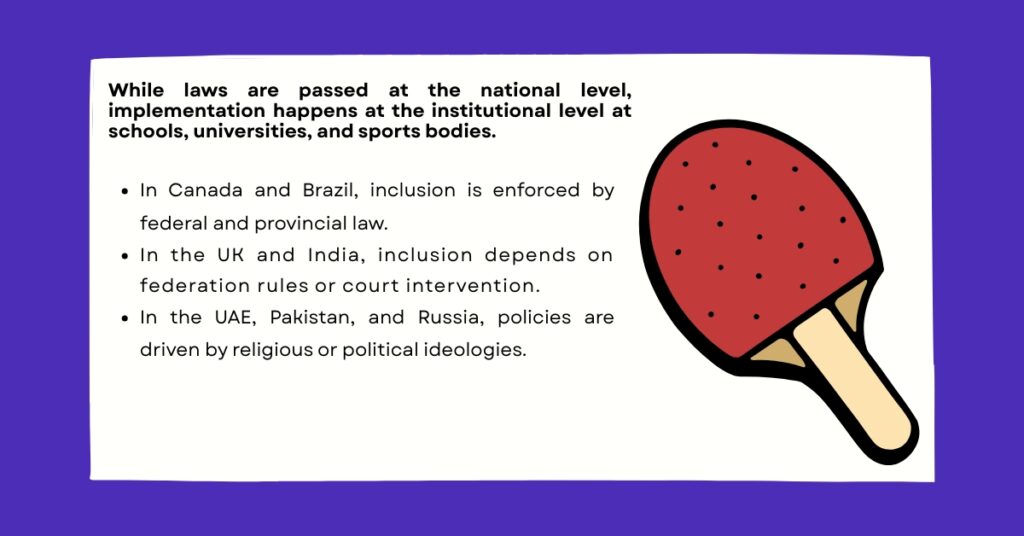
School vs Elite Sports: Legal Fault Lines
The legal tests for transgender sports participation differ vastly when applied to educational institutions versus elite competitive sports.
Schools and Colleges
- Subject to anti-discrimination mandates (Title IX in the US, Trans Act in India, Equality Act in the UK)
- Often allow self-identification
- Less medical scrutiny, more inclusion-oriented policies
- Participation usually linked to educational equality, not elite competition
Elite and Professional Sports
- Governed by national/international federations
- Apply performance-based or safety-related thresholds
- May require hormone suppression or transition documentation
- Emphasize competitive fairness, not just identity
This divergence creates tension. For instance, a trans girl accepted in school athletics may face exclusion when qualifying for national-level competition. Courts are increasingly called to resolve this dissonance, but legal consensus remains elusive.
India: Recognition Without Regulation
Legal Framework
- NALSA v. Union of India (2014): Affirmed the constitutional right to gender self-identification under Articles 14, 15, 19(1)(a), and 21.
- Transgender Persons (Protection of Rights) Act, 2019: Prohibits discrimination in education and healthcare but offers no sports-specific rules.
Case Law
- Anamika v. State of Kerala (2022): Kerala HC ruled that a transgender woman must be allowed to compete in the female category in judo due to the absence of a trans category.
Current Legal Vacuum
No policy from the Sports Authority of India (SAI) exists yet on transgender athlete eligibility.
United Kingdom: Legal Rights with Regulatory Retreat
Legal Framework
- Equality Act 2010 protects gender reassignment status but allows exclusion under Section 195 for fairness/safety in sport.
RFU Policy Shift (2022)
- Banned transgender women from female contact rugby, citing safety and fairness.
- Currently under review after potential legal challenge.
Read more: Reuters RFU Ban Coverage
Canada: Leading the Inclusion Model
Federal and Provincial Law
- Canadian Human Rights Act, amended in 2017, includes “gender identity or expression.”
- Provinces like Ontario and British Columbia enforce these rights through school policy manuals.
Institutional Practice
- Athletics Canada: Self-ID based competition allowed.
- CSSF: Trans students compete in categories matching their gender identity.
- No medical transition is required.
Canada sets the benchmark for transgender sports participation inclusion globally.
United States: Litigation-Led Jurisprudence
Title IX & Executive Orders
- Title IX prohibits sex-based discrimination in federally funded education programs.
- President Biden’s 2021 EO expanded Title IX to cover gender identity.
Key Cases (Pending in 2025 Term)
- B.P.J. v. West Virginia: SCOTUS to rule on trans girl’s right to compete in girls’ school track team.
- Little v. Hecox: Challenge to Idaho’s ban on trans women in women’s sports.
Read More: SCOTUSblog Case Preview
Polarization
- 20+ states have passed laws restricting transgender sports participation in public schools.
- No federal-level sports-specific statute yet.
UAE: Traditional Law in a Modern Sports Hub
Sharia and Civil Law
- UAE recognizes only binary genders in law.
- No legal framework for transgender identity or sports participation.
- Transition surgery is not permitted without criminal implications.
Federation Silence
- Major events (e.g., Abu Dhabi MMA Championships) follow international rules, not local law.
In practice, transgender sports participation is impossible without conforming to birth-assigned gender.
Pakistan: Judicial Support Undone by Parliament
Transgender Persons (Protection of Rights) Act, 2018
- Originally allowed gender self-identification.
- 2023 Amendment: Now requires medical board approval for gender change, reversing self-ID model.
Social Backlash
- Trans athletes face online threats and local discrimination.
- No sports-specific law; participation is rare and discouraged.
China: Silence and Control
No Recognition
- China does not recognize gender identity as a protected category under national law.
- Trans people cannot amend legal gender without full surgery and court order.
Sporting Policy
- No national sports policy mentions transgender athletes.
- Participation decisions lie with sports federations, but self-ID is not accepted.
Japan: Slow Progress, Soft Inclusion
GID Law (2004)
- Allows gender change only after surgery and sterilization.
- Currently under Supreme Court challenge for violating human rights.
Schools
- MEXT guidance recommends that schools accommodate gender identity in uniforms and facilities.
- Competitive sport inclusion varies by region and is non-binding.
Russia: Criminalization and Exclusion
2023 Law
- Bans all forms of gender transition, including documentation and surgery.
- Recognizing transgender identity is now legally impossible.
Sports
- Athletes must compete based on birth-assigned sex.
- Violation of law leads to criminal sanctions.
Transgender sports participation is effectively banned in Russia.
France: Inclusion Amid Olympic Scrutiny
Legal Framework
- Discrimination based on gender identity prohibited under French Equality Law (2012).
- CNOSF (French National Olympic Committee) supports IOC self-ID model.
Paris 2024 Olympics
- France has committed to gender-inclusive participation per IOC’s 2021 guidance.
- However, policies vary across federations (e.g., rugby vs swimming).
Brazil: Judicial Activism for Equality
Legal Protection
- Gender identity is protected under Brazilian Supreme Federal Court rulings.
Case Law
- In 2018, the STF recognized that denial of participation based on gender identity violates constitutional dignity and equality.
Inclusive Practice
CBAt (Brazilian Athletics Confederation) allows trans athletes in line with IOC standards.
Brazil is one of the most progressive Latin American jurisdictions for transgender sports participation.
Comparative Matrix
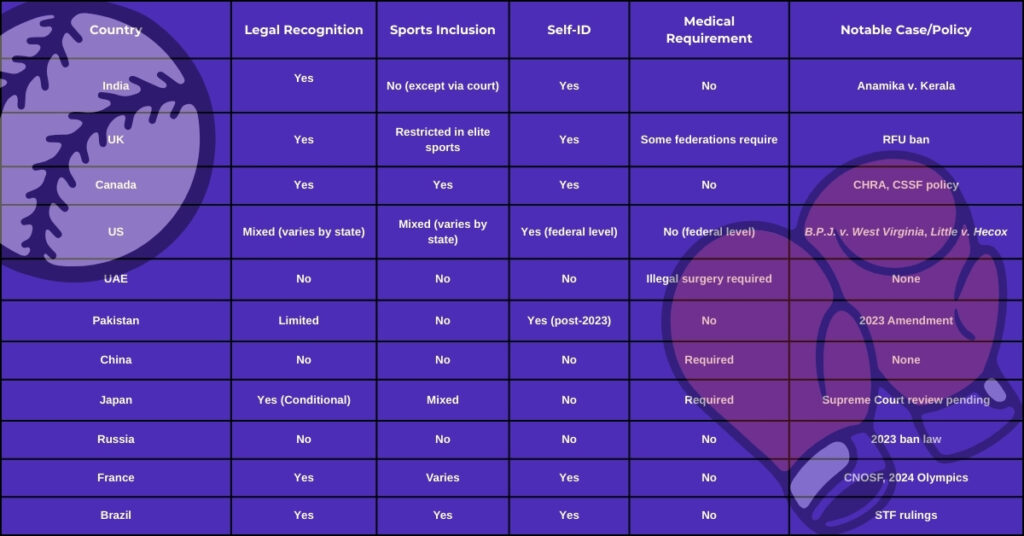
— Thomas Bach, President, International Olympic Committee (IOC)
“Sport must be inclusive. It must welcome everyone, regardless of race, religion, background, gender or sexual orientation.”
Public Sentiment and Its Impact on Legal Reform
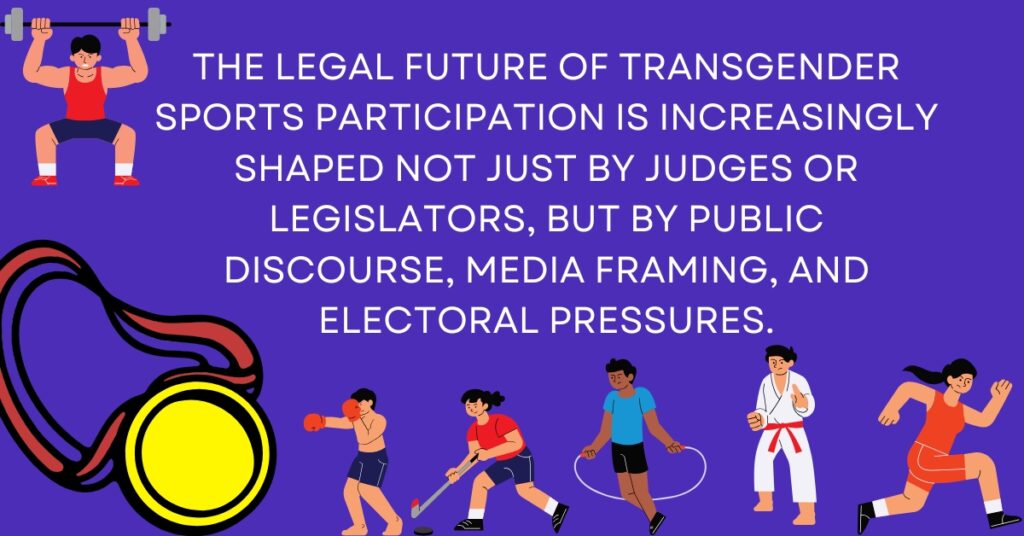
Role of Media and Political Narratives
- In the US, transgender athlete bans became key issues in gubernatorial and congressional campaigns.
- In India, public support for Anamika’s judo case in Kerala was instrumental in the High Court’s prompt ruling.
- In France and Brazil, public opinion favored inclusive Olympic preparation and the normalization of participation rules.
Negative press, misinformation, or political weaponisation of transgender issues can pressure lawmakers to enact restrictive laws, even if such laws are vulnerable to constitutional challenges.
The Role of Allies and Advocacy Groups
Groups like the Sport & Rights Alliance, Athlete Ally, and Transgender Law Center play critical roles in:
- Filing amicus briefs
- Educating federations and lawmakers
- Representing affected athletes in court
Legal change is often preceded by cultural change. Shifting public understanding remains essential to sustainable legal reform on transgender sports participation.
International Human Rights Law and Treaty Obligations
Beyond domestic law and sporting policy, many countries are also signatories to international human rights treatiesthat influence the legality of excluding transgender athletes.
Relevant Global Instruments
- Yogyakarta Principles (2007): Affirm the right to participate in sports regardless of gender identity.
- CEDAW (Convention on the Elimination of All Forms of Discrimination Against Women): Increasingly interpreted to include protection against discrimination based on gender identity.
- UNESCO Charter on Physical Education and Sport: Promotes inclusiveness and non-discrimination in sport access.
While not all instruments are legally binding, courts and tribunals often reference them when interpreting ambiguous domestic statutes or setting precedent.
UN Guidance and State Accountability
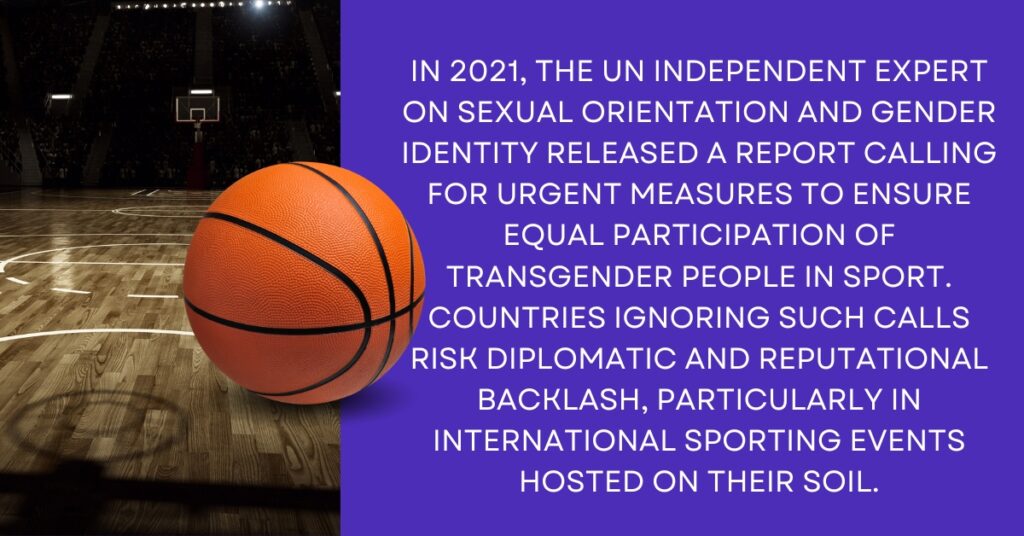
Concluding Addendum: Why Comparative Legal Clarity Is Urgent
The comparative legal analysis of transgender sports participation shows an alarming lack of harmonization. While some countries affirm self-identification and inclusion, others criminalize or disqualify trans individuals outright. This inconsistency:
- Violates international human rights norms
- Creates legal confusion for cross-border events
- Harms athletes’ mental health and social dignity
- Invites litigation and non-compliance disputes
Legal practitioners, federations, and policymakers must engage in evidence-based, rights-oriented, and globally coherent reform efforts. LexNova remains committed to helping institutions navigate this evolving terrain with clarity, compliance, and compassion.
Update Tracker
- SCOTUS hearings set for October 2025 on trans sports bans
- Kerala HC to hear SAI draft guidelines appeal (India)
- Japan’s sterilization law under Supreme Court review
- Paris Olympics to enforce IOC inclusion guidelines (July 2024)
References
- Anamika v. State of Kerala (Kerala High Court, July 29, 2022)
- Reuters
- British Columbia’s Human Rights Code
- National Legal Services Authority v. Union of India
- Equality Act 2010
- Canadian Human Rights Act
Final Takeaway
Transgender sports participation is no longer a marginal issue, it now sits at the intersection of constitutional law, public policy, education, and sports governance. From India’s High Courts to the US Supreme Court, from Canada’s inclusive frameworks to Russia’s criminal bans, this issue reveals the true face of gender equality under law.
LexNova Consulting supports institutions, federations, and legal teams in drafting internationally compliant, culturally sensitive, and legally sound policies for transgender athlete inclusion.
Contact us for legal research, policy drafting, compliance audits, or cross-border legal advisory on transgender sports participation.
Read Also
- Chevron Deference Overruled: How the Loper Bright Ruling Shifts Power From Agencies to Courts
- Synthetic Embryos and the Law: Regulating Life Without Fertilization
- Music Copyright in 2025: Ed Sheeran, AI Songs, and the Global Future of Creativity
For Legal Consultation- Contact us here
Disclaimer:
The information provided in this article is intended for general informational and educational purposes only. It does not constitute legal advice, nor should it be relied upon as such. Laws and policies relating to transgender sports participation vary by jurisdiction and are subject to change. Readers are advised to consult qualified legal professionals for advice specific to their circumstances. LexNova Consulting and the author disclaim any liability for actions taken or not taken based on the contents of this publication.

